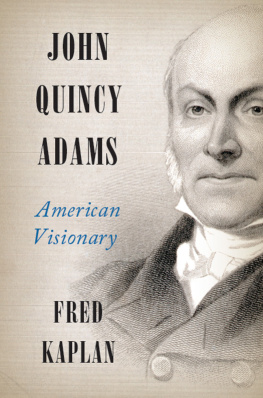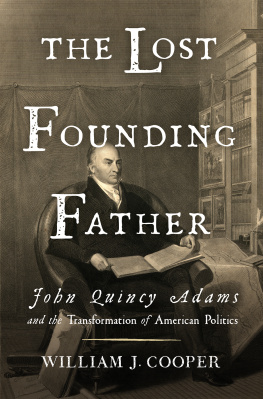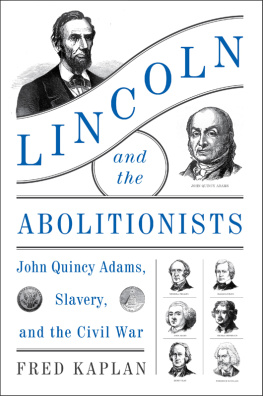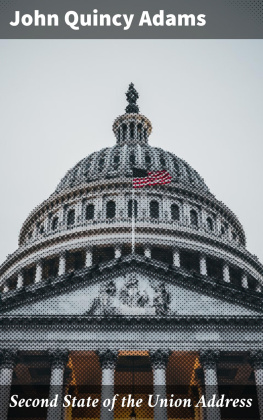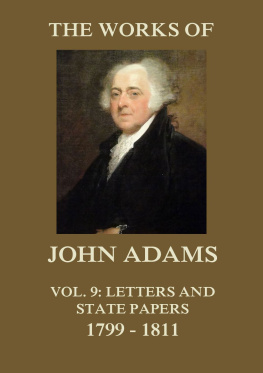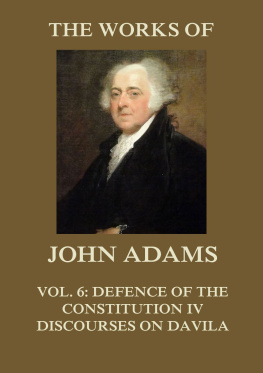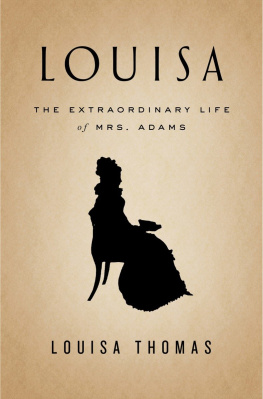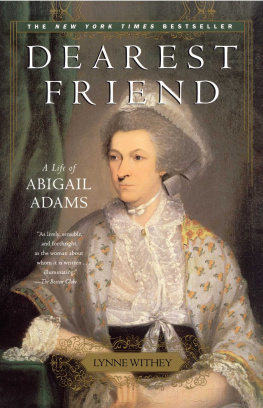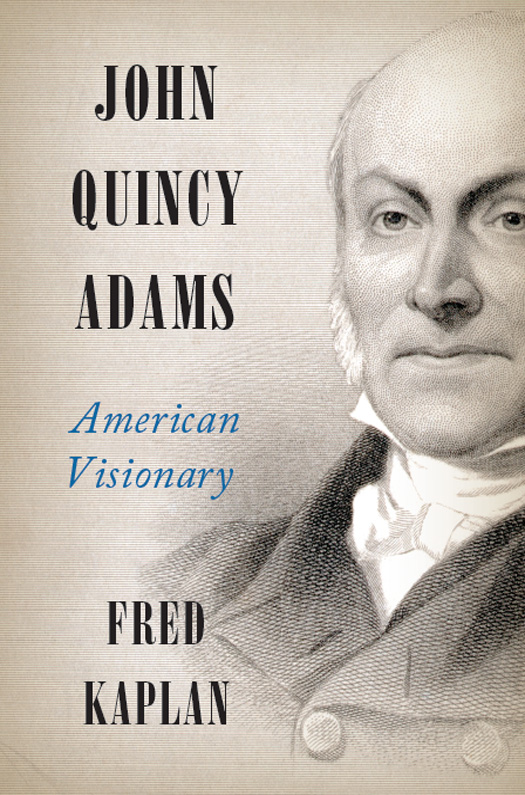This book is dedicated
to two much-loved friends and mentors,
Norman Fruman (19242012)
and
Carl Woodring (19192009).
CONTENTS
J OHN Quincy Adams is a president about whom most Americans know very little. In comparative rankings he inhabits the netherworld of the list, not as quickly dismissed as James Buchanan and Franklin Pierce but not even in the ranks of Grant, Madison, Monroe, and Polk, and nowhere near the upper tier of Truman and McKinley, let alone the pantheon of Washington, Jefferson, the two Roosevelts, and Lincoln.
Was Adams indeed a failed one-term president hardly worth deliberating about today? This book tells a far different story. The totality of his life, including his presidency, is a significant tale about accomplishment and failures. It is a story not only about our sixth presidents America but about America now. His values, his definition of leadership, and his vision for the nations futureparticularly the difficulty of transforming vision into reality in a country that often appears ungovernableare as much about twenty-first-century America as about Adams life and times.
Like Lincoln, Adams, with sharp intellect and scholarly brilliance, was a gifted writer in personal and public prose. He was also a capable poet. Every word that he spoke or published on matters of public policy he wrote himself. Literature has been the charm of my life, he wrote in 1820, and could I have carved out my own fortunes, to literature would my whole life have been devoted. I have been a lawyer for bread, and a Statesman at the call of my Country. His poems are often graceful, witty, immediate, and engaging in the eighteenth-century sense; some are lightly occasional, others autobiographical. Gifted with a caustic strain, he also wrote satiric poetry with a bite, and his religious and patriotic poetry engaged his deepest feelings. As he studied languages, he translated Greek, Latin, German, and French writers. He wrote essays on literary as well as political topics, particularly Shakespeares plays. His book-length history of weights and measurements, on the face of it a dry subject, is an example of a government report turned almost into a masterpiece by its philosophic overview and cogent style. His 1833 Report of the Minority of the Committee on Manufactures and his argument in 1841 before the Supreme Court in the Amistad case are brilliantly written public documents on public policy and human rights.
From his earliest years, Adams detested slavery: he was one of only two anti-slavery presidents between the founding of the country and the election of Lincoln. Like Lincoln thirty years later, Adams despised the populism, states rights, and pro-slavery policies of his successor, Andrew Jackson. The Whig Party, which came into existence in 1834 and lasted until 1856, and with which Adams became affiliated, was Lincolns until 1856. The policies that it advocated and those of the new Republican Party of 1860 were those of Adams presidency: strong central government, federally supported infrastructure policies, and effective but not expansive executive power. Like Lincoln, Adams believed that the Constitution was a living document; the Western territories belonged to the entire American people; taxing and being taxed were essential to responsible self-government; the country required a modern, national, and regulated banking system; slavery was an abomination that needed to be contained and ultimately eliminated; Native Americans deserved to be respected and brought into the American community; and the federal government had an important role to play regarding the general welfare in the creation of educational, scientific, and artistic institutions, such as the Smithsonian Museum, the national parks, the service academies, and land grant universities.
The weakness of Adams presidency resulted from the determination of his political opponents not to allow him any public policy achievements. With divided government, they had the power to do that. The pro-slavery and land-hungry South and West had good reason to believe that Adams had strong abolitionist sympathies and that he favored a higher price for government land in order to fund federal projects. In 1828, Jackson defeated Adams bid for re-election. He brought to the office a rush of executive authoritarianism, intemperate demagoguery, the spoils system under the guise of reform, harsh racism, strong support for slavery, and anti-intellectual ignorance. Without the constitutional provision that for every five slaves, three units be added to the total number of white people counted for representation in a congressional district, the popular and electoral college results of the 1824 and 1828 elections would have had a different appearance: Adams would have been elected in 1824 by popular vote rather than by the House of Representatives, and the 1828 election would have been closer and far from the landslide that it has been misrepresented as having been. Adams became the only former president to serve in Congress, where he continued for sixteen years, emerging to public notoriety as the most outspoken opponent of slavery and of the Southern stranglehold on the American government in high public office. All his life he feared the dissolution of the Union. Slavery would destroy it, he believed, unless some future president would use the war powers inherent in the Constitution to end slavery. There would be rivers of blood. He both dreaded and hoped for the Civil War.
From his adolescence until his last days, Adams kept a diary: his most varied, brilliantly observed writing achievement, a record of political activities and personalities; theatrical performances and religious reflections; his reading, thoughts, and meditations. That achievement, like all his writing on public subjects, was enlightened by a vision of an America that would move confidently into its destiny, a national union in which individual liberty harmoniously co-existed with federal programs that promoted economic, social, scientific, and cultural progress. It was also deeply personal, a living organism, containing his account of the objective world and his inner life. Much of what went on in his imagination and his heart embodied the dynamic interaction between his reading and what he wrote in his diary. The unpublished original reveals a man of deep feeling. In conjunction with his private letters, it provides us with a moving self-portrait of a loving husband married to an estimable woman; of an engaged father who suffered the misfortune of the deaths of three of his four children; of a son who carried the blessing and burden of his parents belief in his high destiny; and of a man engaged throughout his life in searching for the right balance between emotion, religious belief, and rational analysis.
In February 1830, Adams wrote a letter that includes a piece of powerful writing that resonates with his own life, with the intensity of his diary, and with the ironies and tragedies of American history.
Every one of the letters of Cicero is a picture of the state of the writers mind when it was written. It is like an invocation of shades to read them. I see him approach me like the image of a phantasmagoria. He seems opening his lips to speak to me and passes off, but his words as if they had fallen upon my ears are left deeply stamped upon the memory. I watch with his sleepless nights. I share his solitary sighs. I feel the agitation of his pulse, not for himself but for his son... for his country. There is sometimes so much in it of painful reality that I close the book. No tragedy was ever half so pathetic. My morning always ends with a hearty execration of Caesar, and with what is perhaps not so right, a sensation of relief at the 23 stabs of the Ides of March.... Everything else in the story is afflicting and gloomy.

